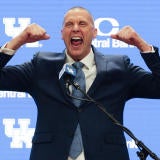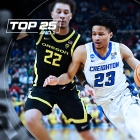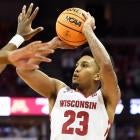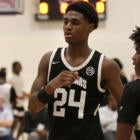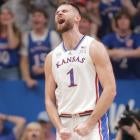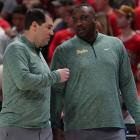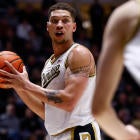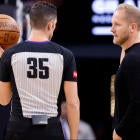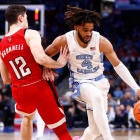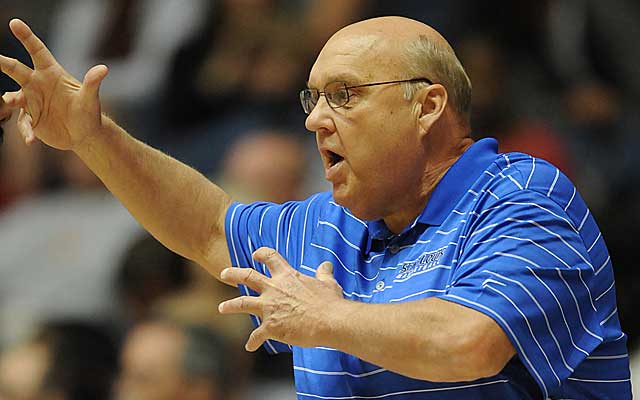 |
| Rick Majerus could be tough on players. (US Presswire) |
Rick Majerus was more than any one thing. In fact as complex as his game planning and schemes were, as indepth as his breakdowns and insight on each and every aspect of the game was, Majerus as a person was equally complex.
My thoughts on Majerus are out of the deepest respect, derived from my firsthand knowledge and the way in which our lives crossed paths at two different periods of each of our lives.
Majerus was a great coach, but he was not simple. He constantly had a war going with local reporters. Marc Jackson, who would have been his last point guard at Utah, quit the team only to rejoin the Utes when Majerus left. He asked Jim Boylan if he promised to call him by his name and not the "C" word he would come back.
| More on Majerus |
| Analysis |
 Jeff Goodman
Tough Majerus was a basketball lifer to the end  |
| More content |
"Why would I call you that?" Boylan asked.
"That is all that Rick would call me, so I quit," Jackson said.
Majerus was hard to play for, hard to work for, and though he preached discipline from his players, he, like many coaches, displayed little of it in his personal life and in his language.
On the other hand Majerus was self-deprecating, thoughtful and interesting. He loved basketball -- really, really loved it -- and if you listened and could comprehend some of the over-analytical jargon, you would glean nuggets galore.
Majerus first started recruiting me when I was sitting out at Golden West College. Majerus said he was interested in seeing my tapes from when I played Notre Dame, wanted to talk to the coaches and get a sense for who I was as a person. He then decided to come out and watch me work out.
Majerus came to town a day early with his staff as they were set to play UC Irvine the following day. Most teams practice at home after classes are over, fly out and shoot late at night at the game site's arena or just wait until shootaround the morning of the game.
Not Majerus. He loved southern California. Especially the beach. So he brought his 96-97 teams out a day early more for his own desire than anything having to do with the game. Utes star Keith Van Horn was from Diamond Bar and so UCI was fairly close, and if there was one thing Majerus absolutely respected, it was family.
Keep in mind Andre Miller was from LA, Van Horne from Diamond Bar and others had SoCal ties as well. Majerus wanted his guys to spend time with their families, not just pop in for a game. So Majerus and his righthand men, Jeff Judkins and Donnie Daniels, showed up at my practice.
I was redshirting at a junior college and not playing in an effort to make a decision late in the spring, and play right away at the school I would transfer to after receiving my associates degree. (This is a loophole in which a player can leave and sit out so that you have a clear sense of what a team looks like just 5 months or so before you play for them. Otherwise you have to sit a year and coaches and teams change a great deal in the month you cannot play in games.)
Majerus watched practice, and then asked me to hang around. He waited until the gym was empty and asked if I wanted to work out for him since I had a reputation of a guy who could not shoot and was really athletic. Obviously this was an NCAA violation, but Majerus didn't care, and neither did I. He wanted to know straight away if I could play or not.
We shot, they ran me, and they made me defend, timed my sprints and generally killed me. Then after nearly two hours Majerus stopped and said, "All right you can play for me, but your dad cannot call me and talk basketball with me, ever. I'm hungry, let's go to Spoons."
Spoons was a chain restaurant near the campus of UC Irvine. We sat for more than an hour talking ball.
Majerus had Andre Miller for another year; I had three years of eligibility left. Over the time we talked he told me in detail how he would use me.
He said that Miller was at his best when he played no more than 32 minutes. You could tell in his voice he loved Miller and Van Horn as if they were sons. Andre was a pro, Van Horn an All-Star in the pros, and I would fit their roster perfectly starting alongside Miller, playing 28-30 minutes.
Majerus had sets in mind to use both of us. He knew already that I was a left right shooter and had certain ways in which I could get easy looks and regain my confidence.
"Here is how it will work. Your dad thinks you can be John Stockton, I don't. In fact I told him to never say that out loud to anyone again, but that doesn't mean I don't understand why he believes it. He is your dad, he loves you, but you will never be John Stockton." Majerus said. "But you can be better than John Crotty and play in the NBA a long time because you can really see the floor.
"You pass well out of either hand, which is rare, and you can pass in the half court and full court equally well. Your shot needs to take some arch off it, and your ball placement changes, but you have to find someone who finds your shots, lets you take your shots and doesn't put you in a position to take shots that expose your weaknesses."
He went on: "You are small but strong and athletic, you are tough and can guard and I think you would be great, but Andre will start, you will play the two and when he leaves it is your team."
As Majerus spoke, he started to eat my fries. He had ordered a salad and, though he talked openly about his diet, he asked if he could have some fries and of course I nodded my approval. After he devoured the fries he looked at my burger, grabbed the waitress and said he would like the same.
Majerus told me he loved the beach to level that he loved food. In fact he made it a point to say that his dream job was UC Santa Barbara and he would leave Utah to walk the beach in Goleta.
He talked about his mom and Milwaukee, a city that connected us as I was born there when my father was the head coach at UW Milwaukee. And he was a player, then a coach at Marquette. He asked me to come to practice, but not sit close. He didn’t want anyone on the team thinking he was unhappy with his current team and prove to be distracting.
His practice was a masterpiece. Each drill had a purpose, and when anything didn't go the way he wanted, he would sharply tell a player to give him 4 or 6 or 8 lines. A player would nod, sprint to the end line and run down and back with great purpose, all while Majerus wasn't looking.
That stuck out to me. I had heard how harsh he could be. He cursed a lot, he called players stupid, told them to wake the heck up, only he didn't say heck up. But his players didn't seem to hang their heads, or never ever dare talk back. Whether it was fear or respect, he said run, they sprinted.
The one coaching takeaway was how he had chairs lined up under the basket for the starters. He had 5 walk-ons as scout teamers and shaggers. Every time Utah ran a set, each walk-on would feed a starter so that each player ran the play all the way through and got a shot of the play. It was amazing.
Then the scout-teamers would run through the other team's plays while the starters had their notebooks handy to watch the scout, then they would get up and guard them. I felt like Van Horn and Miller were his guys and they could do little wrong, though he was harder on Van Horn than Miller at least for that practice.
My takeaway was that they ran a ton of sets and that you better know the tendencies and scouting report or he would put his foot up your rear end.
Obviously, I didn’t go to Utah, but it is a bit more complex than just choosing Oklahoma State. The week before I was set to visit Salt Lake City the NCAA passed a new rule. The rule was an addendum to the prop 48 rule in that if a player graduated on time who had lost his first year to the rule, he would get that year back for a fifth year.
Miller was set to graduate on time, so he would now have two year left to play and Majerus again was brutally honest on the phone.
"You don't want to play the two for two-thirds of your career here. Andre is better than you, but you would play together, but he is my point guard as long as he is here." So I crossed Utah off the list.
Utah went on to go to the national championship game the next year. As a matter of fact, Majerus' Utes came though Anaheim where he used a triangle and two to beat defending national champion Arizona by more than 20.
My brother was an assistant in the Mountain West Conference for eight years. While San Diego State went from five wins during Steve Fisher's first year with the Aztecs to the juggernaut they are now, it was their first road win over Utah that signaled a changing of the guard in the league.
"We beat the Majerus! We have arrived," my brother told me.
Majerus' teams may never have reached the heights of 1998 again, but his teams were never bad and when you beat the "Fat Man," as other coaches called him, and did it in SLC, it was as if you climbed Everest and lived to talk about it.
Majerus stayed at Utah a year or two too long, but did so with his health in mind. In order to receive lifetime healthcare benefits from the state of Utah you have to work for the state for 10 years, which is why he stayed on salary after he left the school.
Fast forward to his time at ESPN and Majerus seemed like a perfect fit. ESPN is a haven for ex-coaches. It has a need for quality content and the space to find platforms to talk ball whenever and wherever you want.
But Majerus really struggled in Bristol. He didn't like it in studio. Maybe it was the sterility of not being near the locker rooms or at the games, maybe it was the fact that so few knew basketball at his level and he felt like he was surrounded by TV people, not basketball people.
He hated being told how long to talk, didn't want to know where to look and he would answer every question of what he wanted to talk about with, "I just want to talk ball."
In fact, if you watch Big Monday, Rob Lemly, a producer at ESPN, has used the Talking Ball for Big Monday halftimes the past five years or so. It is a tip of the cap to the coach who was very difficult to some, but those like Lemly in studio or Mike Molinari on games that reached out to build a relationship are Majerus guys for life.
For me it was like getting the cheat codes on how to win each game by sitting next to him and I did so for two different NCAA tournaments. Though I had heard he was tough on producers, when Jeff Anderson, then our producer, asked him to use a white board and do a scouting report for the NCAA finals, Rick flipped for the idea. What was left was gibberish to television, and to non-basketball people it looked like VCR instructions that made little sense.
In fact it was in the hall way outside SportsCenter for at least four years without anyone erasing.
While he hated being told to talk for 45 seconds, he loved to just talk ball and more and more guys started to gather close to him during the biggest of NCAA games.
Majerus was one of a kind. He constantly talked about wanting to get healthy, he swam every day and his jacket, which is a size 56 I believe, is still sitting in an office in Bristol.
Like coaching, Rick had some people whom he didn't seem to treat well, but his genius, his passion for his sport and his friendship was appreciated, though it was complex.
In my world we talk about guys as good guys or bad guys. My take, from my perspective is that Majerus was a good guy with a huge heart. But his pain was buried in food and occasionally I believe it manifested itself in how he treated others. I loved his teams' passion for him and his passion for them last year in the tourney and I do think he mellowed some in his last couple years rebuilding Saint Louis, so not every story about the old Rick Majerus holds true.
But like so many other legendary figures the great is wrapped in the weird, questionable and in some cases downright mean ways in which he treated others in an earlier life. He won, he graduated his players and his career will be remembered for that more than anything.







